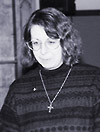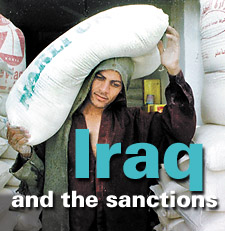|
|
|
Seeing for themselves
By Michelle Martin
Staff writer
The dozen Dominicans who visited Iraq this month found it to be
“stunningly beautiful.”
But they also saw the stunningly cruel results of the Gulf War
and ongoing U.S.-supported sanctions.
Before they went, the 10 sisters, one priest and one lay associate
had read the UNICEF reports saying that upwards of 6,000 children
a month die from preventable diseases and from malnutrition, directly
related to sanctions. They had heard about huge increases in the
rate of childhood cancers, especially leukemia and lymphomas.
They had seen pictures of mothers holding their dying children.
Then they saw for themselves.
Dominican Father Richard Woods recalled an infant with a tumor
the size of a large orange in his mouth.
“This little boy will die,” said the priest, moments after ariving
at O’Hare from the March 5-19 trip. “He’s nine months old. But
there’s nothing they can do.”
The pediatric hospital in Basra, in southern Iraq, is crowded
with similar cases, he said.
|
|
|
|
|
|
|
|
|
|
‘We go out of a faith-based reason. Maybe we can move people’s
hearts and stir the moral consciousness of people, help them see
that the other person has a right to self-determination and basic
human rights.’
|
|
Medical officials in Iraq blame the growing rate of cancers on
radiation poisoning from the use of depleted uranium weapons against
Iraqi tanks during the Gulf War. But the battlefields cannot be
cleaned, because sanctions make it impossible to get the needed
equipment. The children with cancer cannot be treated with radiation
or chemotherapy, because the hospitals cannot get the drugs, said
Woods, a visiting professor at Dominican University in River Forest.
“You see the mothers sitting there with these children, and you
know they are most likely going to die,” Woods said, calling it
a “massacre of the innocents,” perpetuated by the mistakes of
both the U.S. and Iraqi governments.
|
|
|
|
 |
|
Dominican Sister Roberta Popara prepares to travel to Iraq. Catholic New World / Sandy Bertog |
|
Other children have been born with a variety of birth defects,
the likes of which doctors in Iraq had never seen. Some are born
without eyes, without noses, without limbs. Some defects are reported
to be similar to the defects seen in American children born to
Gulf War veterans.
Other kinds of birth defects also have increased, including spina
bifada—perhaps because it has become difficult for pregnant women
to get folic acid, said Dominican Sister Rene Weeks of La Jara,
Colo.
“Some of the things we take for granted are things they really
miss,” she said.
The group was the third Dominican “Voices for Veritas” delegation
to travel to Iraq since 1999. Their purpose was twofold: to raise
awareness in the United States about the devastation the sanctions
have visited on ordinary people, and to offer love and support
to the Iraqis, especially the Dominicans working in schools, hospitals
and parishes there.
The journeys violate the U.S. travel ban to Iraq, putting everyone
who goes at risk for fines and jail time, but so far no one who
has gone has been arrested.
Sister Roberta Popara, a doctoral candidate at Chicago Theological
Union, said she thinks the Dominican groups traveling can help
make Americans aware of the situation because they have no political
agenda.
“We go out of a faith-based reason,” Popara said. “Maybe we can
move people’s hearts and stir the moral consciousness of people,
help them see that the other person has a right to self-determination
and basic human rights.”
Given the regime in Iraq, she acknowledged, the people likely
would not enjoy all such rights even without the sanctions.
“The current government doesn’t provide a full measure of rights,”
she said. “But the sanctions aren’t working. They are hurting
the people, not the government.”
Because the travelers had spoken with members of the previous
two groups, they knew for the most part what to expect.
But the contrast between the beauty of the country and the warmth
of its people, and the suffering caused by the aftermath of the
Gulf War and the eight-year Iran-Iraq war before that brought
many of the travelers up short.
The group visited Baghdad, Basra in the south, and Mosul in the
north. They found startling contrasts: Michael Jackson music videos
played on television while babies were dying from diarrhea caused
by contaminated water—a result of the destruction of water filtration
plants in bombing raids.
“Some of these visits were exhausting,” Woods said. “The people
were very warm, very hospitable. They would offer us tea or whatever
they had. But the suffering was extreme, especially in the south.”
Conditions generally seemed better in Mosul than further south,
which took the brunt of the Gulf War and of bombings since then,
Woods said.
It was while sightseeing there that Popara and Sister Beth Murphy
of Springfield had one of the defining experiences of the trip
for them. The sisters visited the Mosque of Nebi-Yunis, believed
by some to be the burial site of the prophet Jonah in the ancient
city of Nineveh.
A woman there asked where they were from. When they said they
were from the United States, “she held out her hand and said ‘Welcome.
Your country is my country,’” Murphy said. “The irony of it—what
our country has done to her country—put a knife through my heart.”
E-mail Michelle Martin at [email protected].
top
Front Page | Digest | Cardinal | Interview
Classifieds | About Us | Write Us | Subscribe | Advertise
Archive | Catholic Sites | New World Publications | Católico | Directory | Site Map
|
|







